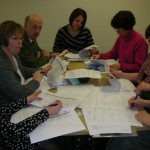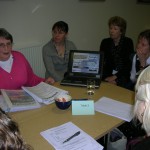Information and Critical Literacy: Aberdeenshire - a joint development event for Network Librarians and Literacy Co-ordinators
 Friday, March 19, 2010 at 1:40PM
Friday, March 19, 2010 at 1:40PM The first session was by Kathryn Russell, Literacy Development Officer 'Literacy across learning: working in partnership'. Kathryn tasked the groups / tables with the following:
 Literacy across Learning: working in partnership
Literacy across Learning: working in partnership- Please give an example of successful partnership working between teacher(s) and librarian(s). What factors were key to success?
- Barrier / constraint to effective partnership: Suggested solution
- Looking to the future ... how would you like to see the working relationships between teachers and librarians evelove?
There was much lively discussion with 'what worked' going in a box in the shape of a book and 'what didn't work' going in a small wasterpaper bin. Sue Cromar, Information Literacy Librarian, ALIS who organised the event and is writing a guide to partnership working collected all the information. The guide should be available in August / September this year.
Next up was Alison Bruce, Information Services Librarian, ALIS - online resources for pupils and teachers. Alison demonstrated Credo Reference using a Science Experience and Outcome relating to the lungs. The retrieved resources demonstrated had pictures and texts plus source citation. The resources could also be shown as a Concept Map (Mind Map, Spider Diagram) with items linked to the references. The map could be simplified or expanded and the main topic could be changed. It was very impressive.
After tea / coffee break I did a presentation and workshop on Integrating Information and Critical Literacy across the curriculum . The workshop centered on each group / table unpacking a Curriculum for Excellence Experience and Outcome.
 Librarians, teachers and Literacy Officer unpacking a CfE Experience and Outcome
Librarians, teachers and Literacy Officer unpacking a CfE Experience and Outcome Participants in mixed groups:
- choose a Curriculum for Excellence Learning Experience and Outcome – Science or Health and Well Being
- unpack it using CfE template created by Edinburgh Science QIO and used by Holy Rood High School, Edinburgh (link to case study and template) - unpacking is effectively a mapping exercise which allows the opportunities within the learning outcome to be explored.
- link to Literacy across learning experiences and outcomes specifically ‘information and critical literacy’ activities
- identify relevant ‘information and critical literacy’ resources.
The workshop went well and it was interesting to hear the discussions and see librarians and teachers working in partnership to unpack their chosen experience and outcome. One school librarian was keen to replicate the exercise in her school as part of an in-service day.
After lunch there was a carousel exercise were groups (different groups from the morning) started at one table to hear about information literacy activities created and or used by Aberdeenshire schools:
 Joint Geography Library Webquest
Joint Geography Library WebquestTable 1: Evaluating online resources - using Learning and Teaching Scotland's online Information Literacy material
Table 2: Note-making and mind-mapping - RISK (Research and Investigation Skills) developed at Meldrum Academy by the Netwwork Librarian and teaching staff. A CD of the programme and material was included in the event pack of information given to everyone.
Table 3: Webquests - joint working between Geography Principle Teacher and school librarian
- Aberdeenshire Library and Information Service Draft Information Literacy Strategy
- Libraries Supporting Learning from 0 - 18 Information Guide for Parents and Teachers
The day was a great success and Sue Cromar recorded aspects of it for the Libraries R 4 Learning Project: Information Literacy Multimedia clips .




